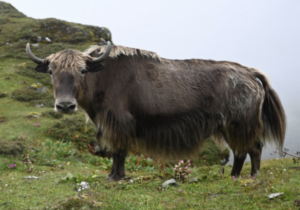Arunanchali Yak Genome Sequenced
India Achieves First Chromosome-Level Genome Assembly of Yak through Landmark Public-Private Partnership
Dirang, Arunachal Pradesh | Ranchi | Hyderabad | May 2025 – In a significant milestone for Indian livestock genomics, scientists have successfully completed the first-ever chromosome-level genome assembly of the Indian yak (Bos grunniens), marking a scientific breakthrough with far-reaching implications for conservation, sustainable livestock development, and rural economies in the Himalayan region.
The project was a result of a collaborative effort led by four premier ICAR institutions-ICAR-NRC on Yak (Dirang), ICAR-IIAB (Ranchi), ICAR-CIRC (Meerut), and ICAR-CICR (Nagpur)-in partnership with Nucleome Informatics, a Hyderabad-based genomics company known for its leadership in genome sequencing and assembly in India. The study was funded under the ICAR-NEH initiative aimed at improving region-specific agricultural productivity.

The research team used cutting-edge long-read sequencing technologies and advanced genome assembly tools to generate a high-quality reference genome, precisely mapping genes to their respective chromosomes. This genome will serve as a critical resource for improving traits such as cold tolerance, disease resistance, and milk production, especially vital for communities in high-altitude regions like Ladakh, Sikkim, Arunachal Pradesh, and Himachal Pradesh. “This genome will allow us to better understand and sustain yak populations, which are integral to biodiversity and rural livelihoods in the Himalayas,” said Dr. A.K. Mohanty, Director, ICAR-CIRC. “This is a major breakthrough for yak research,” added Dr. Mihir Sarkar, Director, ICAR-NRC on Yak. “We must now translate these insights into conservation action and targeted breeding programs.” Dr. Sujay Rakshit, Director of ICAR-IIAB, emphasized the opportunity to mine beneficial alleles through comparative genomics. “This work shows how NEH-focused funding can be strategically deployed for commodities of regional importance,” he said.
The success of this project highlights the growing importance of public-private partnerships in advancing India’s biotechnology landscape. By combining the institutional strength of ICAR’s scientific network with the technological capabilities of Nucleome Informatics, this collaboration sets a precedent for future high-impact genomic initiatives in India.
“The successful assembly of the Indian yak genome is a testament to what’s possible when institutional science and biotech innovation come together,” said Dushyant Singh Baghel, CEO of Nucleome Informatics. “We are proud to contribute our genome sequencing and assembly expertise to a project that not only advances scientific understanding but also supports the livelihood of Himalayan communities.”
The complete genome assembly has been made publicly available to the global scientific community to encourage further research and foster innovation in livestock genomics.
Publication is available here: Nature Article
Media Contact:
Nucleome Informatics Pvt Ltd
Email: info @ nucleomeinfo.com | Website: www.nucleomeinfo.com
ICAR-NRC on Yak
Dirang, Arunachal Pradesh


Sorry, the comment form is closed at this time.